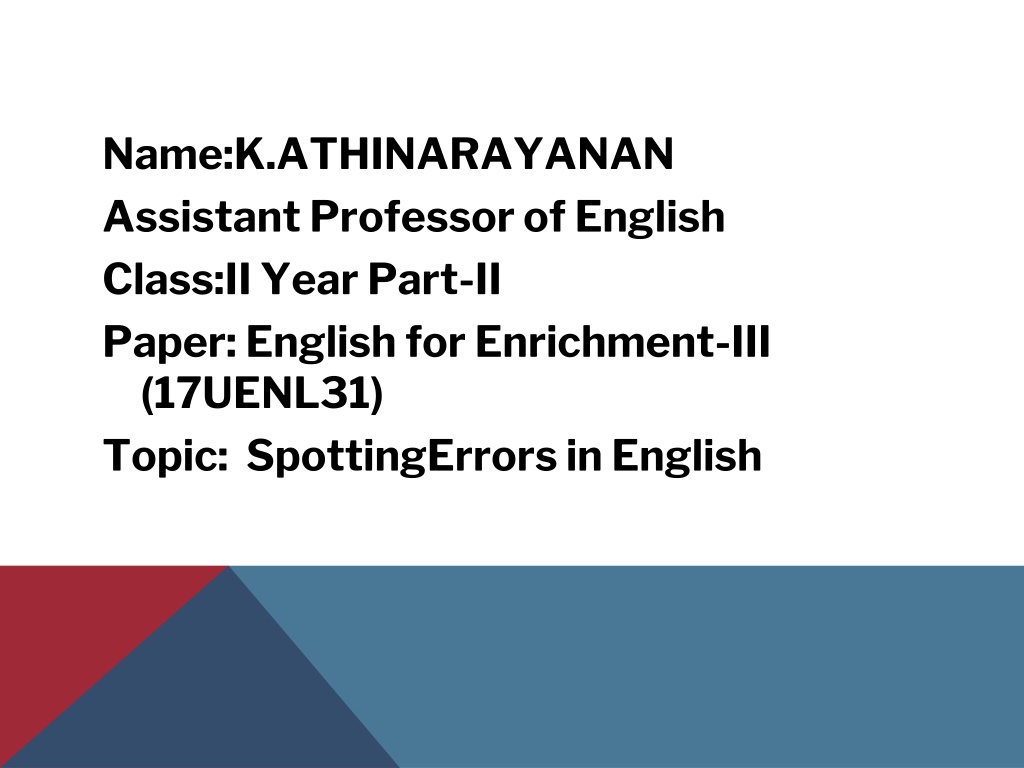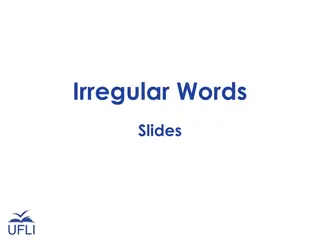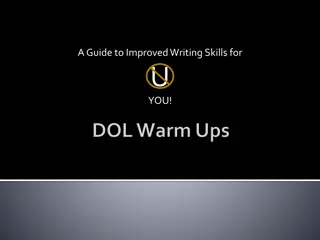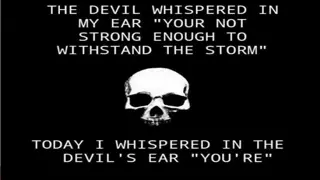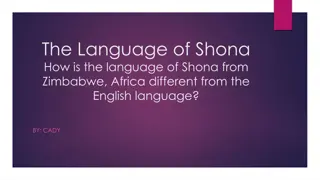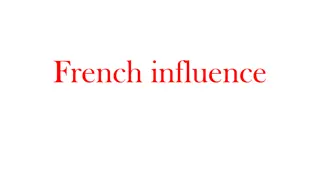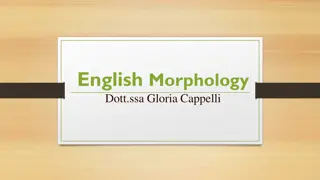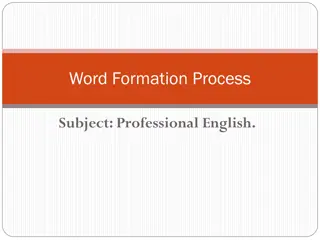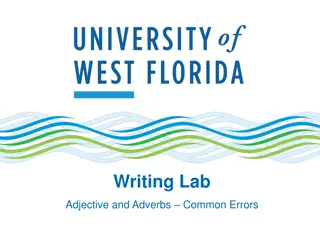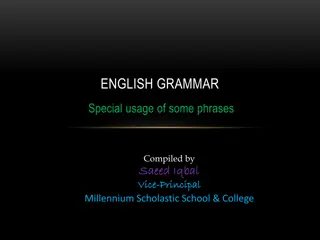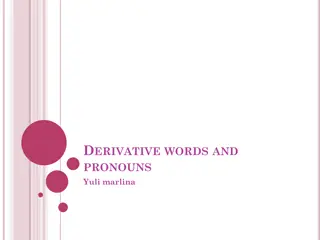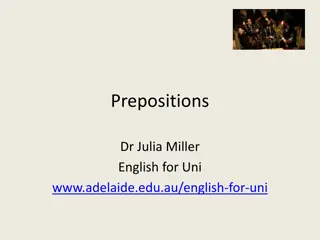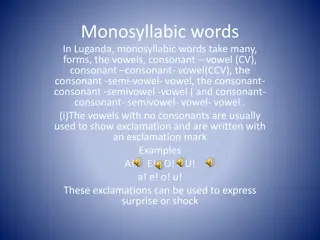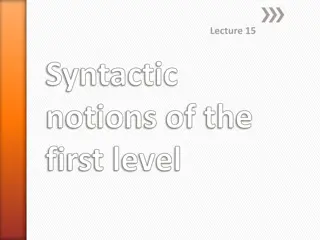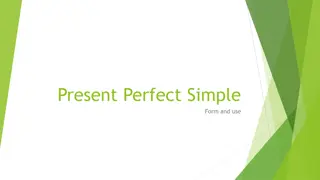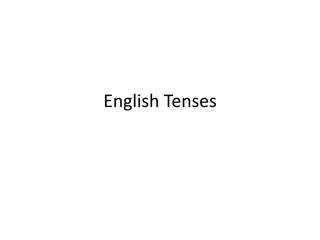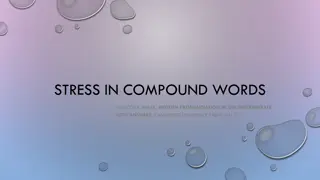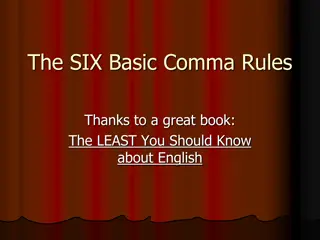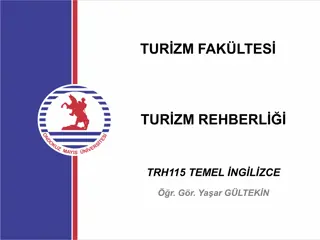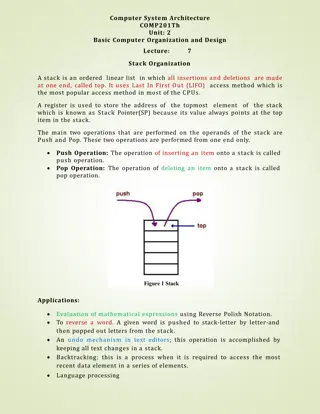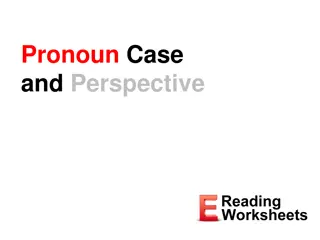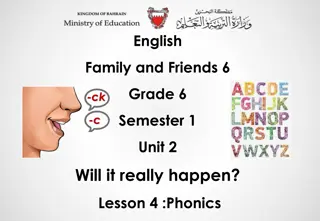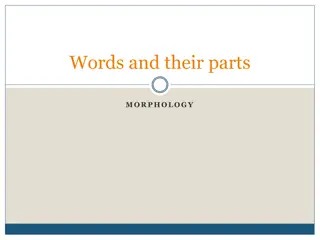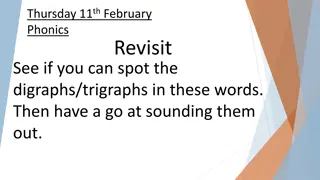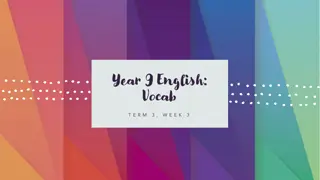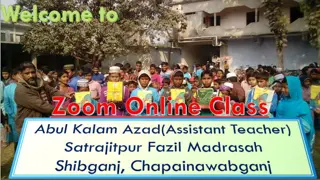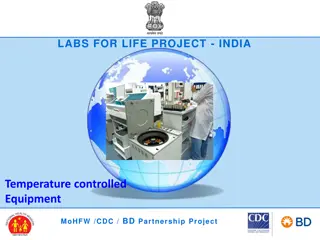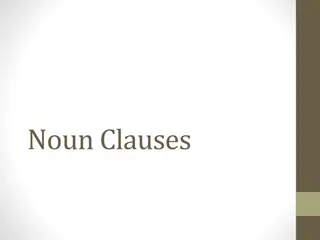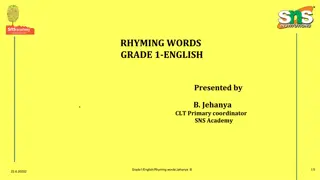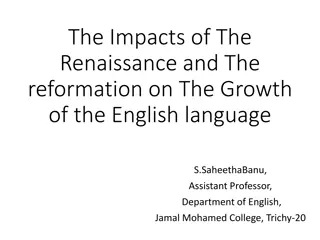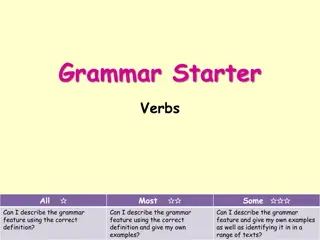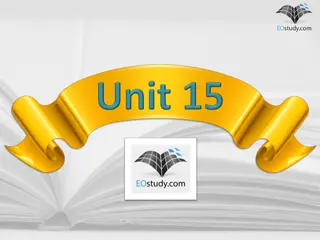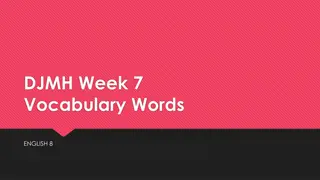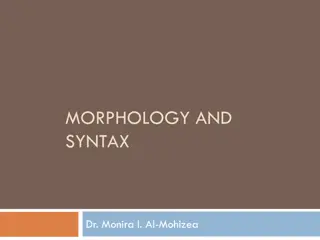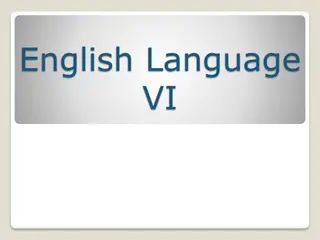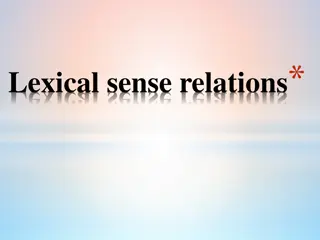Commonly Confused Words in English Usage
Understanding and differentiating between commonly confused words in English can improve writing accuracy and clarity. Examples include distinctions between "they're, their, there," "you're, your," "who's, whose," "it's, its," "to, too, two," and more. Proper usage of these words enhances communication effectiveness.
Download Presentation

Please find below an Image/Link to download the presentation.
The content on the website is provided AS IS for your information and personal use only. It may not be sold, licensed, or shared on other websites without obtaining consent from the author. Download presentation by click this link. If you encounter any issues during the download, it is possible that the publisher has removed the file from their server.
E N D
Presentation Transcript
Name:K.ATHINARAYANAN Assistant Professor of English Class:II Year Part-II Paper: English for Enrichment-III (17UENL31) Topic: SpottingErrors in English
THE PURPOSE OF GRAMMAR Clarity of meaning Readabilit y Credibilit y
TYPES OF ERRORS Wrong-word errors Punctuation errors Usage errors
TYPES OF WRONG-WORD ERRORS Spelling and Typographic Mistakes Don t just rely on spell check! Wrong Meaning Use a dictionary. Be careful using the thesaurus. Watch out for words with the wrong shade of meaning or the wrong meaning altogether. Commonly Confused Words Spell check won t catch these!
COMMONLY CONFUSED WORDS They're / Their / There They re going to store together. (contraction of they are ) The managers are in their weekly meeting. (possessive) Place the flowers there. (adv. indicates location/direction) You're / Your You're going to be a great writer! (contraction of you are ) Your hair looks nice today. (possessive) Who's / Whose Who's on first base? (contraction of who is ) Whose watch is this? (possession)
COMMONLY CONFUSED WORDS It's / Its / Its It s a beautiful day! (contraction of it is ) Download the program, along with its readme file. (possessive) Its is not a word. Affect / Effect The outage shouldn't affect anyone during work hours. (verb to act on, influence) The outage shouldn't have any effect on users. (noun result)
COMMONLY CONFUSED WORDS To / Too / Two I am going to the store. (preposition) She decided to go along too. (adv. also) My jacket is too small. (adv. to an excessive amount) I have two buttons missing. (number) A lot / Alot / Allot The workers are worrying a lot about their jobs. (adv. to a great degree/extent) Alot is not a word. We were each allotted twenty tickets. (verb to assign/distribute)
COMMAS Use a comma and a coordinating conjunction (and, but, for, or, nor, so, yet) to join two independent clauses. The game was over, but the crowd refused to leave. Yesterday was her birthday, so they went out to dinner. Use commas after introductory clauses, phrases, or words that come before the main clause. While I was eating, the cat scratched at the door. To get a seat, you'd better come early. Well, perhaps he meant no harm.
COMMAS Use commas to separate three or more words, phrases, or clauses written in a series. The Constitution establishes the legislative, executive, and judicial branches of government. Use commas to set apart a parenthetical phrase in a sentence. My friend Jessica, who lives in Connecticut, is a yoga teacher.
SEMICOLONS Use a semicolon between two related independent clauses that are not joined by a conjunction. The participants in the first study were paid; those in the second were unpaid. Use a semicolon to separate elements in a series that already contains commas. The students in the class were from Lynchburg, Virginia; Washington, D.C.; and Raleigh, North Carolina.
SEMICOLONS Use a semicolon to join two independent clauses when the second clause begins with a conjunctive adverb (however, therefore, moreover, furthermore, thus, meanwhile, nonetheless, otherwise) or a transition (in fact, for example, that is, for instance, in addition, in other words, on the other hand). I really have no interest in politics; however, I do like to stay informed by watching the debates.
COLONS Use a colon to introduce a list preceded by an independent clause. The application includes the following pieces: personal information, job history, and references. Use a colon to separate an independent clause and a final phrase or clause that illustrates, extends, or amplifies the preceding thought. They have agreed on the outcome: informed participants perform better than do uninformed participants. Road construction in Dallas has hindered travel around town: parts of Main, Fifth, and West Street are closed during the construction.
APOSTROPHES Use an apostrophe to create a contraction (but don t use contractions in your academic writing!). I don t like him very much. Use an apostrophe to form a possessive noun. My mother s job is better than all my brothers jobs put together. Dickens s later works are much darker than his early novels. Do NOT use an apostrophe to form a plural. Remember that it s = it is, but its is possessive.
QUOTATION MARKS If the sentence ends with the quotation (and if there is no parenthetical citation), put your final mark of punctuation INSIDE the quotation marks: That dog is as big as a horse. If the sentence continues after the quotation, you ll usually need a comma AFTER your quotation but BEFORE your final quotation mark: I wish this workshop were over, John said. If the quotation ends in an exclamation point or question mark, omit the comma: I hate going to the dentist! John bellowed.
QUOTATION MARKS If your sentence ends with a footnote, put the superscript number AFTER your final mark of punctuation: According to Car and Driver, the Denali is among the most agile of full-sized sport utility vehicles. 15 If the sentence ends with a parenthetical citation, omit the punctuation at the end of the quotation (unless it is a ? or a !): According to Car and Driver, the Denali is among the most agile of full-sized sport utility vehicles (Csere 20).
FRAGMENTS A complete sentence must have three components: 1. A subject (the actor in the sentence) 2. A predicate (the verb or action) 3. A complete thought (it can stand alone and make sense). A fragment is an incomplete sentence. It cannot stand alone and does not express a complete thought. Some fragments lack either a subject or verb or both. Dependent clauses are also fragments if they stand alone.
FRAGMENT EXAMPLES Went out of business after Starbucks Coffee opened. One of my friends who won a contest by playing a variety of instruments. Since I went fishing.
RUN-ON SENTENCES A run A run- -on sentence is sentence comprised of two or more on sentence is sentence comprised of two or more independent clauses not properly separated. independent clauses not properly separated. Lack of punctuation and/or conjunctions Incorrect punctuation A comma splice A comma splice two independent clauses joined by a two independent clauses joined by a comma comma is a run is a run- -on sentence. on sentence. A run A run- -on sentence is not simply a long sentence. on sentence is not simply a long sentence.
RUN-ON SENTENCES Long sentences can be grammatically correct. Long sentences can be grammatically correct. During the 1960s, development thinking, encompassing both ideology and strategy, prioritized economic growth and the application of modern scientific and technical knowledge as the route to prosperity in the underdeveloped world and defined the "global development problem" as one in which less developed nations needed to "catch up" with the West and enter the modern age of capitalism and liberal democracy, in short, to engage in a form of modernization that was equated with westernization (and an associated faith in the rationality of science and technology). (86 words)
RUN-ON EXAMPLES My favorite Mediterranean spread is hummus it is very My favorite Mediterranean spread is hummus it is very garlicky. garlicky. It is nearly half past five, we cannot reach town before dark. It is nearly half past five, we cannot reach town before dark.
DANGLING PARTICIPLES A dangling participle is a word or phrase that modifies a word not clearly stated or an unintended noun in the sentence. Correcting dangling participles: Reword the sentence. Provide the missing information.
DANGLING PARTICIPLE After rotting in the cellar, my brother brought up some oranges. Featuring plug-in circuit boards, we can strongly endorse this server s flexibility and growth potential. Having finished the assignment, the TV was turned on.
VERB TENSE Verb tenses should be consistent throughout your writing. Reviews of literature should be in the present tense. Historical events should be in the past tense. Correcting tense shifts: Be consistent throughout your sentences and paragraphs. Be familiar with verb forms and tenses.
TENSE SHIFT EXAMPLES About noon the sky darkened, a breeze sprang up, and a low rumble announces the approaching storm. We viewed A Caribbean Mystery and watch intently as Joan Hickson portrays Agatha Christie s Miss Marple. I climbed out of the car, walked through the door, and prepared to meet the parents, but instead a large, honey-colored dog runs to meet me at the door.
PRONOUN/ANTECEDENT AGREEMENT Pronouns are words that take the place of nouns. Antecedents are the words that the pronouns refer to. Pronouns must agree with their antecedents in number, gender, and person. Number = singular or plural Gender = masculine, feminine, or neuter Person = 1st, 2nd, or 3rd person
P/A AGREEMENT ERROR EXAMPLES Everyone should make their own decisions. Each speaker maintained their poise.
SUBJECT/VERB AGREEMENT Singular subjects must have singular verbs. Plural subjects must have plural verbs. Rule of thumb: Subjects ending in s are plural Verbs ending in s are singular Correcting agreement errors: Become familiar with irregular verb forms. Focus on the subject, not any additional modifiers.
S/V AGREEMENT ERROR EXAMPLES The box of ornaments belong in the attic. High levels of mercury occurs in some fish. What we need are more pots and pans.
EDITING YOURSELF Learn the rules. Plan ahead leave yourself enough time to edit. Know your writing weaknesses. Read aloud or in reverse. Don t be afraid to delete!
E-RESOURCES Books A good dictionary/thesaurus Style guides (APA, MLA, Turabian) Strunk & White s classic The Elements of Style, and others Web resources www.liberty.edu/universitywritingprogram http://owl.english.purdue.edu Be sure to use credible websites! People
